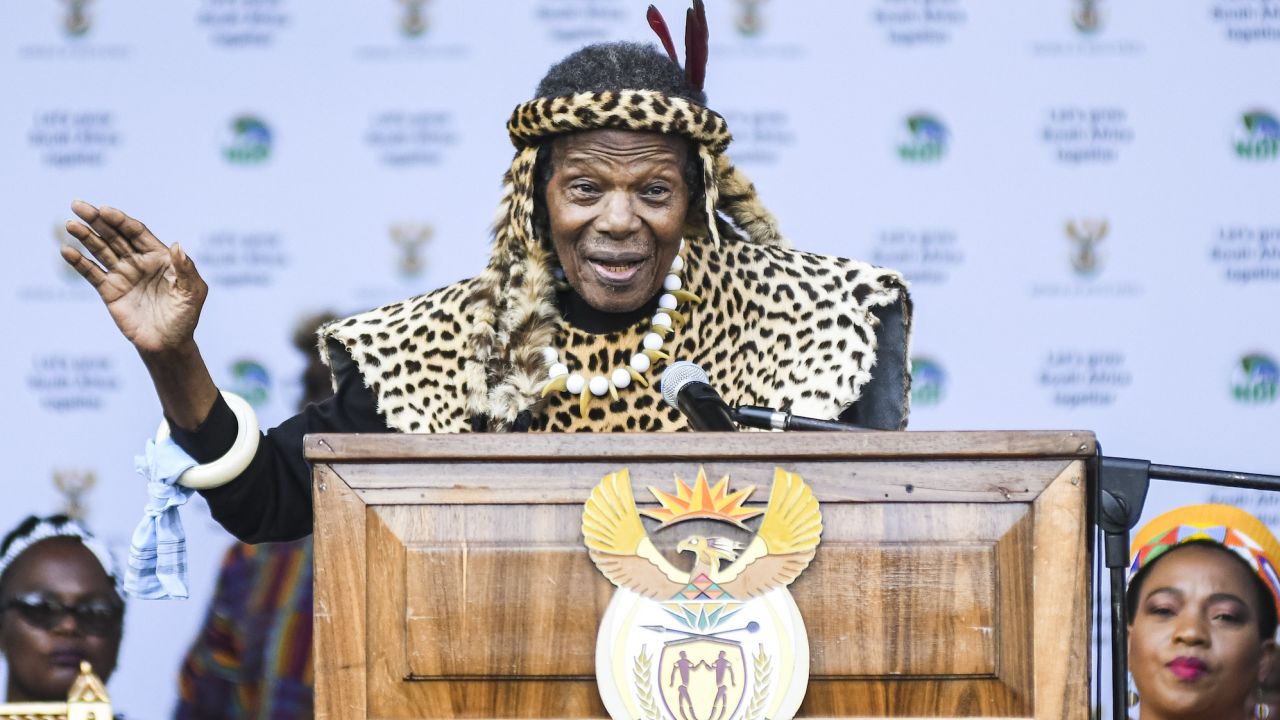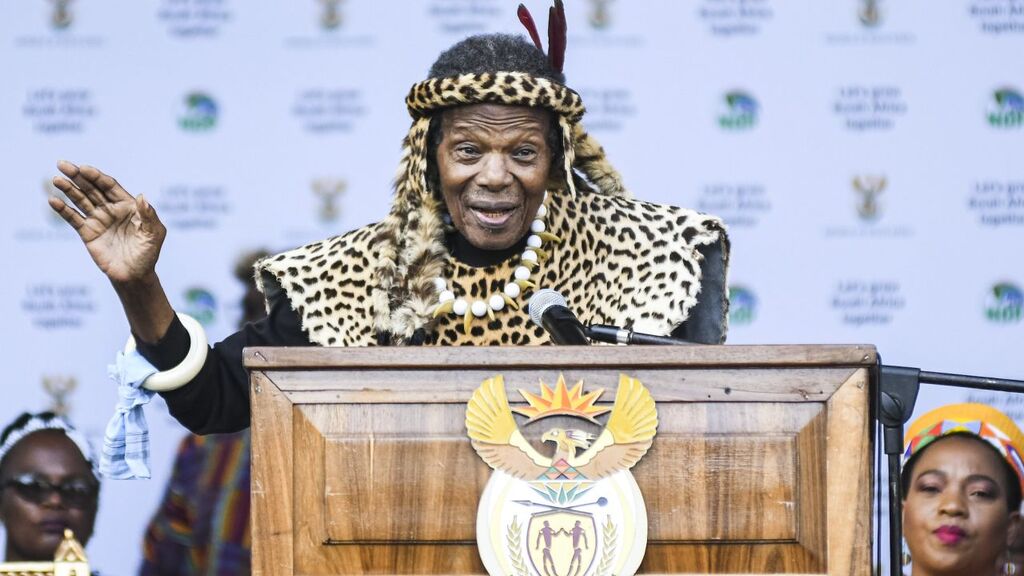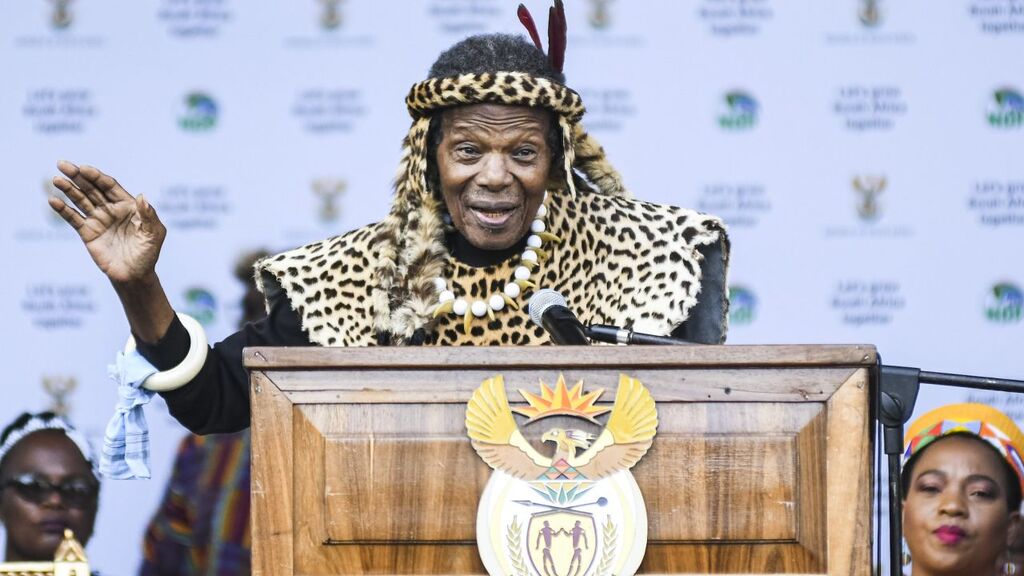
Sadly Mangosuthu Buthelezi has died, aged 95
Mangosuthu Buthelezi, who established South Africa’s resistance Inkatha Opportunity Party and served for 10 years as a bureau serve after the country’s most memorable multiracial decisions, has passed on. He was 95.
Buthelezi died in the early long periods of Saturday morning, the South African administration said in an explanation gave by instant message. Plans are being made to grieve and respect him as “a considerable pioneer who plays had a critical impact in our country’s set of experiences for a long time,” it said.
Buthelezi drove Inkatha from 1975 to 2019, subduing a few endeavors by opponents to unseat him before at last resigning. He stayed a powerful figure inside the party, holding the title of its leader emeritus and addressing it in parliament.
He was scorned by pundits for working together with South Africa’s politically-sanctioned racial segregation rulers and embroiled in supposed basic liberties infringement during a long-running clash with the African Public Congress, which won power in 1994. He somewhat reclaimed his standing by producing harmony among Inkatha and the ANC, joining Nelson Mandela’s administration.
Guinness Record : Mangosuthu Buthelezi has died
Buthelezi procured a spot in the Guinness Book of Records for conveying the longest-ever political discourse — a 400-page rhetoric that crossed five days — and played Zulu Lord Cetshwayo, his granddad, in Zulu, a 1964 film featuring Michael Caine.
A Zulu ruler, Mangosuthu Gatsha Buthelezi was brought into the world in Mahlabathini in the eastern KwaZulu-Natal region on Aug. 27, 1928. Subsequent to procuring a professional education in 1950, he started getting ready to be a legal counselor prior to cutting short his arrangement to turn into the tribal leader of the Buthelezi family.
He stood firm on a few authority footholds in KwaZulu, a domain South Africa’s White system laid out for the Zulus, the country’s greatest ethnic gathering, and was its central priest from 1976 to 1994.
In 1975, Buthelezi laid out the Inkatha Public Social Freedom Development, which attempted to propel the interests of South Africa’s Dark larger part. While he fashioned close binds with the ANC — he had a place with its childhood wing as an understudy — relations decayed over the ANC’s choice to wage war against the politically-sanctioned racial segregation government and call for worldwide approvals.
Undeclared Conflict : Mangosuthu Buthelezi has died
Political contention among Inkatha and the ANC swelled into an undeclared nationwide conflict that prompted in excess of 12,000 passings during the 1980s and mid 1990s before it finished. The contention was stirred up by the White government, which needed to make divisions among the nation’s Dark larger part, as per Reality and Compromise Commission.
The commission, made in 1995 by the public authority to test politically-sanctioned racial segregation time abominations, tracked down Inkatha answerable for basic liberties infringement. Inkatha’s authority, aligned with the White security powers and arranged fierce assaults against ANC allies, as per its 1998 report. Inkatha dismissed the commission’s discoveries as one-sided and incorrect.
Buthelezi took steps to blacklist the 1994 races in a bid to win more prominent political independence in Inkatha-controlled region, yielding days before the vote. Inkatha won 10.5% of the public vote and control of KwaZulu-Natal.
In 1990, Buthelezi’s social development changed itself into the Inkatha Opportunity Party, which supported federalism and an unregulated economy.
Contents
- 1 Acting President :Mangosuthu Buthelezi has died
- 2 Buthelezi, who had eight youngsters, is made due by two girls and a child. His significant other of very nearly 67 years, Irene, kicked the bucket in Walk 2019.
- 3 The claims incited a furious reaction: Mangosuthu Buthelezi has died
- 4 Boss Mangosuthu Buthelezi was a perplexing figure :Mangosuthu Buthelezi has died
- 5 Sadly Mangosuthu Buthelezi has died, aged 95
Acting President :Mangosuthu Buthelezi has died

He was selected pastor of home undertakings in Mandela’s bureau and named acting president multiple times when Mandela was out the country, a signal pointed toward stopping pressures between the ANC and Inkatha.
Buthelezi rejected the ANC’s give of the country’s representative administration as a trade off for Inkatha surrendering the KwaZulu-Natal prevalence and in 2004 then-president, Thabo Mbeki, excluded him from the bureau.
Inkatha’s political fortunes disappeared in 2009 after Jacob Zuma, likewise a Zulu, was named South Africa’s leader, empowering the ANC to catch a huge portion of its conventional help base. Inkatha got only 3.4% of the public vote in May 2019 decisions, held three months after the ANC constrained the embarrassment polluted Zuma to step down as president and supplanted him with its new chief, Cyril Ramaphosa.
Inkatha’s fortunes hence got as it gained by open discontent over elevated degrees of destitution, joblessness and unite, and it won control of various town committees in KwaZulu-Natal.
Buthelezi, who had eight youngsters, is made due by two girls and a child. His significant other of very nearly 67 years, Irene, kicked the bucket in Walk 2019.
During politically-sanctioned racial segregation, he was the main pastor of the KwaZulu Bantustan: a semi-free domain designated to the Zulu nation by the nation’s racial oppressor government.
His organization was generally viewed as a manikin system: subject to the South African state for power, prejudiced of political resistance and overwhelmed by Inkatha – the party he established in 1975.
He tracked down normal reason with the African Public Congress (ANC) in the battle against politically-sanctioned racial segregation and lobbied for the arrival of Nelson Mandela.
In any case, he went against the ANC’s position on equipped activity and global authorizations, contending that they hurt dark South Africans.
During the change to multi-party a majority rules system, Buthelezi dreaded the disintegration of his power. He requested a more bureaucratic arrangement of government, with ensures that the situation with conventional Zulu pioneers would be regarded.
The ANC deviated, and upwards of 12,000 passed on in savage conflicts among Inkatha and Nelson Mandela’s allies in the mid 1990s, which are broadly accepted to have been fuelled by the politically-sanctioned racial segregation government.
Some dreaded the viciousness would prompt nationwide conflict, yet Buthelezi at last enlisted in Mandela’s administration of public solidarity in 1994. Regardless of proceeding with strains, he filled in as pastor for home undertakings for 10 years.
His Inkatha Opportunity Party (IFP) attempted to extend its political arrive at past its power base among Zulus, the country’s biggest ethnic gathering, yet Buthelezi endure endeavors to eliminate him from its administration.
He at long last remained down as IFP president in 2019: one of the extraordinary overcomers of South African legislative issues, and one of a handful of the heads of the old semi-independent countries who adjusted to the post-politically-sanctioned racial segregation period.
Boss Mangosuthu Buthelezi was brought into the world in what was then south-eastern Zululand on 27 August 1928.
His mom was Princess Magogo kaDinzulu, the sister of the Zulu lord and a popular vocalist of conventional tunes.
The lord had organized her union with Buthelezi’s dad – the head of a strong faction – to mend a fracture between their two families.
At 14 years old, he was informed that his dad had passed on. Sadly Mangosuthu Buthelezi has died, aged 95
He was taken to the family property. Following Zulu custom, he wounded the ground with a lance to show where the grave ought to be dug and boisterously guaranteed his legacy.
Buthelezi was taught at Adams School, a notable minister school close to Durban, however in 1948 – as he started college in the Eastern Cape – the Public Party was chosen and started carrying out politically-sanctioned racial segregation.
He joined the ANC, battling against the new system close by Nelson Mandela and Oliver Tambo.sanctions, contending that they hurt dark South Africans.
During the change to multi-party a majority rules government, Buthelezi dreaded the disintegration of his power. He requested a more bureaucratic arrangement of government, with ensures that the situation with customary Zulu pioneers would be regarded.
The ANC dissented, and upwards of 12,000 kicked the bucket in brutal conflicts among Inkatha and Nelson Mandela’s allies in the mid 1990s, which are generally accepted to have been fuelled by the politically-sanctioned racial segregation government.
Some dreaded the savagery would prompt nationwide conflict, yet Buthelezi in the end enlisted in Mandela’s administration of public solidarity in 1994. Regardless of proceeding with strains, he filled in as clergyman for home issues for 10 years.
His Inkatha Opportunity Party (IFP) attempted to grow its political arrive at past its power base among Zulus, the country’s biggest ethnic gathering, however Buthelezi endure endeavors to eliminate him from its initiative.
He at last remained down as IFP president in 2019: one of the extraordinary overcomers of South African legislative issues, and one of a handful of the heads of the old semi-independent countries who adjusted to the post-politically-sanctioned racial segregation time.
His political activism got him expelled from university, so he returned to KwaZulu-Natal to take up his duties as chief of his family clan.
He married Irene, a nursing student from Johannesburg. His father was said to have had around 40 wives, but – as a practising Anglican – the new chief resisted traditionalist Zulu pressure to take further brides.
In 1954, King Cyprian appointed him as his traditional prime minister. The post was a powerful one, usually occupied by a member of the Buthelezi family.
A decade later, he appeared opposite Michael Caine in the film Zulu. He played the role of his real-life great-grandfather, King Cetshwayo at the battle of Rorke’s Drift.
By now, the first Bantu authorities had been established and Buthelezi was chosen as KwaZulu’s Chief Executive. A new constitution invested all executive power in him, relegating the king to a largely ceremonial role.
He established his own power base with the creation of Inkatha, ostensibly to campaign for the inalienable rights of Zulus and mobilise against white domination.
But, with his new party’s backing, Buthelezi ruled with an “iron fist”.
Membership of the party was all but compulsory for those who did not want to lose their jobs.
The chief minister took personal charge of his nation’s finances and ultimate control of the police.
Throughout apartheid, Buthelezi refused to accept the – largely nominal – independence that the South African government offered the Bantustans.
“South Africa is one country,” he proclaimed. “It has one predetermination. The people who are endeavoring to isolate the place that is known for our introduction to the world are endeavoring to stem the tide of history.”
In any case, some enemy of politically-sanctioned racial segregation campaigners were condemning of his position.
Steve Biko, the main Dark Cognizance campaigner who later kicked the bucket subsequent to being beaten by the South African security administrations, said Buthelezi was being taken advantage of by the politically-sanctioned racial segregation system and not – as the Inkatha pioneer accepted – working inside the framework to subvert it.
His relationship with the banished ANC administration disintegrated further in the last part of the 1970s.
The ANC was in a partnership with the South African Socialist Faction, while Buthelezi was a heartfelt enemy of socialist. He thought the association was loaded with communists and wouldn’t give safe houses to individuals from its outfitted wing.
He campaigned for the lifting of monetary authorizations against South Africa, demanding that his obligation was to see dark youngsters took care of and dressed.
Buthelezi was lauded for his methodology by English Head of the state Margaret Thatcher, however one ANC extremist depicted him as a South African “government toady” who was “living in a ridiculous situation”.
Diocese supervisor Desmond Tutu even needed to request that he leave a memorial service in light of the fact that such countless dark grievers were tossing stones.
On the detainment of Nelson Mandela notwithstanding, Buthelezi and the ANC tracked down normal reason.
The Inkatha pioneer was undaunted in his mission to see the magic figure liberated from detainment on Robben Island – and later asserted sole credit for achieving his delivery.
In any case, conflicts between allies of the two associations heightened in the approach the principal free races.
For the rest of his life, Buthelezi asserted it was the ANC that actuated the vast majority of the savagery – however proof later arisen that Inkatha got South African military help to fund hit crews.
Reality and Compromise Commission (TRC) – a body laid out to reveal the grimy mysteries of the politically-sanctioned racial segregation time and advance recuperating – blamed him for complicity in gross common freedoms infringement.
The claims incited a furious reaction: Mangosuthu Buthelezi has died

Boss Buthelezi denied truly approving or excusing denials of basic freedoms and distribution of the TRC’s last report in 2003 was deferred until a progression of changes were made at his demand.
A disdain figure for the overwhelming majority ANC activists, he wanted to blacklist the noteworthy 1994 decisions – just to alter his perspective without a second to spare. With polling form papers previously printed, Buthelezi’s photo must be connected to each casting a ballot slip with a sticker.
South Africa’s new constitution required the triumphant ANC to frame a multi-party government, in a type of momentary power-sharing.
Thus, Buthelezi was delegated Priest of Home Undertakings. Every now and then, he even misbehaved as president when Nelson Mandela was abroad.
He held his situation after the 1999 decisions, however relations with the ANC again started to shred.
A column over new migration guidelines finished with the peculiar display of President Thabo Mbeki making a lawful move against an individual from his own administration.
“I’m not mindful,” Boss Buthelezi said later, “of any world point of reference wherein a president sued his own clergyman as well as ventured to such an extreme as attempting to get an expense request against him in his own ability.”
After the 2004 races, Inkatha – rebranded as the Inkatha Opportunity Party (IFP) – got back to the resistance seats.
After five years, the IFP lost discretionary ground against the ANC’s new chief, Jacob Zuma, who was himself a Zulu.
The party’s childhood development in KwaZulu-Natal contended for a difference in initiative and thought of itself as ousted.
In 2019, Boss Buthelezi declared that he wouldn’t look for re-appointment to the IFP administration. He ventured down following 45 years in the position.
He did, nonetheless, stay an individual from the South African parliament and conventional top state leader in KwaZulu-Natal.
In his 90s, he was an essential figure in the Zulu regal family progression fight that followed the passing of Lord Zwelithini in 2021.
Buthelezi’s possibility for majesty won, yet a disagreement regarding the chairmanship of the Ingonyama Trust Board – which oversees huge lots of illustrious land – caused horrible infighting.
In 2023, Ruler Misuzulu kaZwelithini needed to excuse stories that he had been harmed. What’s more, strains inside the imperial family prompted reports that the lord’s relations with his main clergyman had nearly separated.
Boss Mangosuthu Buthelezi was a perplexing figure :Mangosuthu Buthelezi has died
Pleased, quarrelsome, and fanciful, he was well known for his endless parliamentary addresses: one of which was 427 pages in length and required over about fourteen days to convey.
A scary character, he was supposed to be “equipped for exchanging between unrestrained appeal and merciless contentiousness”.
Yet, it was his record during the politically-sanctioned racial segregation years that actually isolates South Africa.
To his allies, Boss Buthelezi gave a valiant effort to safeguard his kin, while attempting to sabotage a malicious system.
However, to his foes, he will be recognized as having involved an agreeable, influential place – when “genuine” campaigners were being detained, banished, beaten and shot..

Be the first to comment